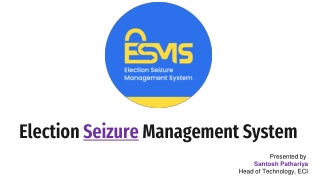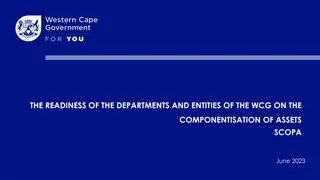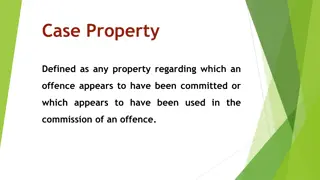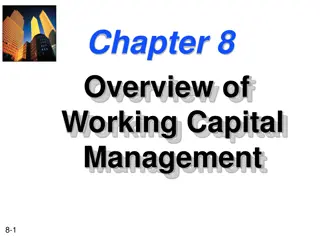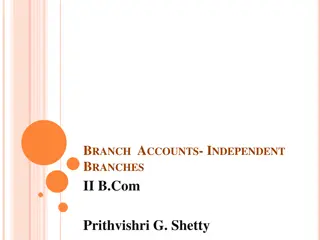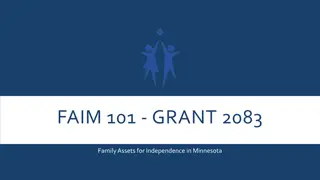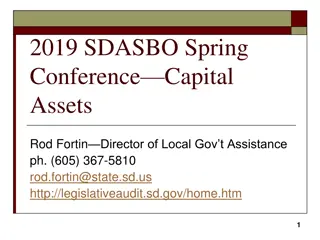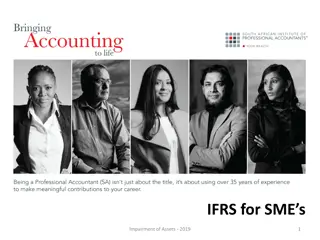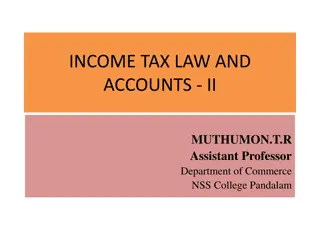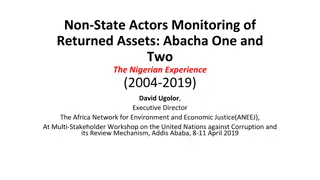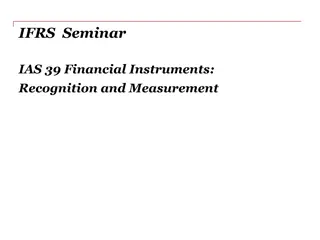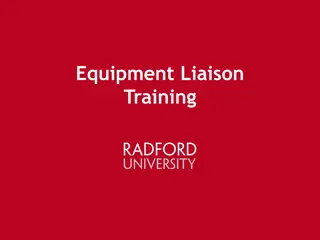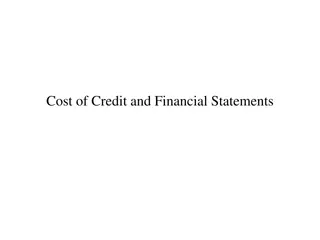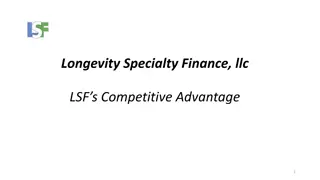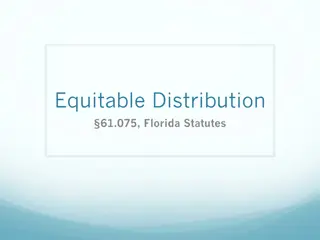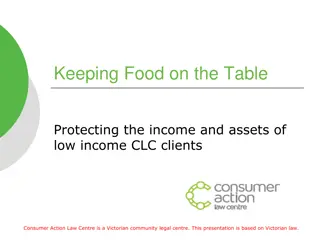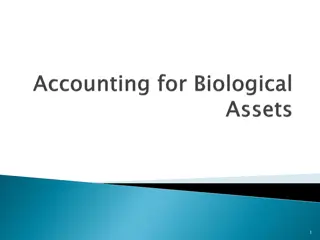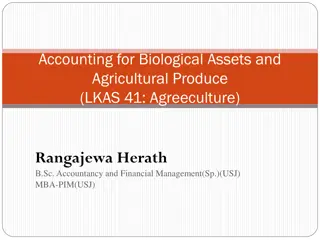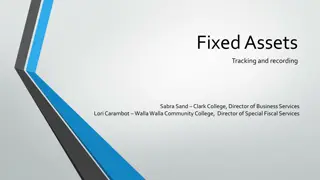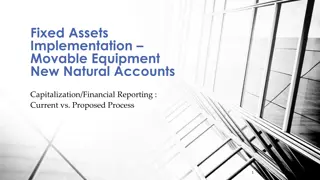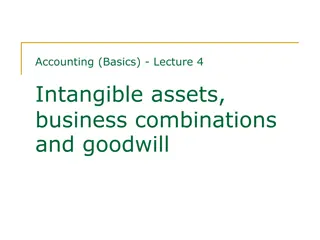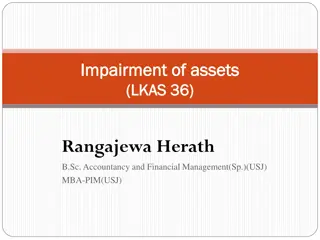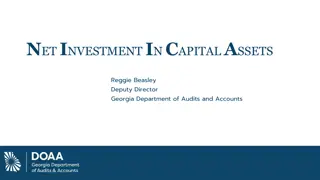Election SeizureManagement System
The Election Seizure Management System (ESMS) presented by Santosh Pathariya, Head of Technology at ECI, aims to ensure inducement-free elections through digitizing data for intercepted/seized items like cash, liquor, drugs, etc. The system involves various agencies and users for real-time reporting
3 views • 48 slides
Componentisation of Assets: Readiness and Overview for SCOPA June 2023
The readiness of departments and entities within the WCG on the componentisation of assets is discussed along with an overview. Componentisation involves breaking down significant parts of assets into individually identifiable parts with different useful lives. Advantages include accurate tracking o
0 views • 7 slides
Guidelines for Handling Case Properties and Seized Assets in Legal Proceedings
This informative content discusses the handling of case properties involved in offenses, including seizure, custody, disposal, and coordination among government departments. It covers various aspects such as the types of case properties, custody procedures, provisions under Section 516-A Cr.PC, and
0 views • 8 slides
Understanding International Inheritance Tax Rules
In the realm of international property and succession law, different legal systems like Common Law and Civil Law govern how inheritance tax applies to individuals with assets in multiple countries. For French residents, navigating French succession tax on worldwide assets is crucial, while non-Frenc
2 views • 27 slides
Overview of Working Capital Management in Financial Management
Working capital management involves strategic decision-making regarding a company's current assets and liabilities to optimize liquidity, profitability, and risk. This process includes understanding working capital concepts, financing current assets, managing liability structure, and maintaining the
1 views • 26 slides
Understanding Independent Branches in Accounting
Independent branches in accounting operate autonomously, making purchases externally, receiving goods from the head office, setting their selling prices, and managing expenses from their own cash flow. They keep complete books, prepare financial statements independently, and may engage in inter-bran
1 views • 10 slides
University of Idaho Asset Management Overview
Asset management at the University of Idaho involves the strategic management of equipment assets to safeguard investments, comply with regulations, and facilitate cost recovery. The objectives focus on enhancing asset monitoring, accuracy of inventory records, personnel training, and adherence to p
0 views • 14 slides
Family Assets for Independence in Minnesota (FAIM) Program Overview
The Family Assets for Independence in Minnesota (FAIM) program helps individuals achieve financial independence through a structured process involving eligibility criteria, opening a savings account, financial coaching, obtaining assets, and closing the account. Eligibility requirements include inco
0 views • 25 slides
Understanding Capital Assets and Financial Reporting
This presentation delves into the world of capital assets, focusing on their categorization, ownership, and reporting in financial statements. Key topics include the distinction between tangible and intangible assets, responsible asset management, and the implications of capital leases on ownership.
0 views • 61 slides
Understanding Impairment of Assets in IFRS for SMEs - 2019
This content discusses the Impairment of Assets in IFRS for SMEs, focusing on determining the true economic benefits of assets for accurate financial representation. It covers exceptions, impairment tests, inventory valuation, and recognizing valuation/impairment losses for inventory categories. A c
1 views • 23 slides
Capital Gains and Assets Overview in Income Tax Law and Accounts
This content provides an overview of capital gains and assets in income tax law and accounts, covering topics such as types of capital assets, assets not considered capital assets, kinds of capital assets (short-term and long-term), transfer year of chargeability, computation of capital gains, and c
0 views • 15 slides
Monitoring of Returned Assets: Abacha's Legacy in Nigeria
International efforts led by civil society in Nigeria and Switzerland have successfully monitored the return of assets linked to the Abacha regime. Initiatives like the Nigerian Network on Stolen Assets and the Conditional Cash Transfer program demonstrate transparency and accountability in handling
0 views • 10 slides
Understanding IAS 39: Financial Instruments Recognition and Measurement
This content provides an overview of an IFRS seminar on IAS 39, focusing on key concepts such as the classification and measurement of financial assets, impairment, reclassification, and more. It covers definitions of financial instruments, financial assets, equity instruments, and financial liabili
1 views • 43 slides
Understanding Liquidation Estate and Key Asset Components
In the process of liquidation, the liquidator forms an estate comprising various assets of the corporate debtor for the benefit of creditors. These assets include ownership rights, tangible and intangible assets, proceeds of liquidation, and more. However, certain assets owned by third parties or he
0 views • 39 slides
University Asset Management Guidelines
University asset management guidelines cover the physical inventory policy, procedures, and fixed asset terminology for safeguarding, tracking, and reporting assets. Departments designate equipment liaisons to manage assets and conduct physical inventories regularly. Assets are categorized as capita
1 views • 21 slides
Political Turmoil in Pre-Babur India
Babur, a Turkic ruler, seized power in India in the early 16th century amidst a chaotic political landscape. With weak rulers in Delhi and conflicting powers across the subcontinent, Babur's successful invasion marked a significant shift in Indian history, leading to far-reaching consequences.
0 views • 8 slides
Understanding Cost of Credit and Financial Statements
The cost of credit refers to the additional amount a borrower must pay, including interest and fees, while financial statements are crucial reports that present a business's financial position and performance. These statements help users make informed economic decisions by providing clear, relevant,
0 views • 17 slides
Revolutionizing Asset Valuation: Longevity Specialty Finance, LLC's Competitive Advantage
Longevity Specialty Finance, LLC (LSF) is setting new standards in valuing level-3 assets and liabilities through their exclusive use of the Longevity Cost Calculator (LCC). The LCC, based on a proven longevity predictive algorithm, allows LSF to accurately price and value assets with unknown future
0 views • 11 slides
Understanding Clubbing of Income in Taxation
Clubbing of income refers to including another person's income in the taxpayer's total income to prevent tax avoidance practices like transferring assets to family members. This concept is addressed in sections 60 to 64 of the Income Tax Act. Key terms include transferor, transferee, revocable trans
1 views • 16 slides
A Comparison of ELI and UNIDROIT Principles on Digital Assets
A comparison between the principles of Electronic Liability Initiative (ELI) and the International Institute for the Unification of Private Law (UNIDROIT) regarding digital assets. ELI focuses on security over digital assets, while UNIDROIT covers a broader range, including transfers, custody, and m
0 views • 5 slides
Understanding Equitable Distribution in Florida
Equitable distribution in Florida, governed by statutes 61.075 and 61.076, determines the fair division of marital assets and liabilities in divorce cases. Key considerations include identification, valuation, distribution presumption, and justification for unequal distribution. Assets are classifie
0 views • 28 slides
Managing Debt and Protecting Client Assets in Victoria
Consumer Action Law Centre in Victoria focuses on assisting low-income clients in managing debt and protecting their assets. The presentation emphasizes assessing the need for debt payment, considering the client's financial position, and exploring options to handle debt where income and assets are
1 views • 29 slides
Understanding Society: Wealth and Assets Survey Research
The Wealth and Assets Survey (WAS) conducted by Oliver Tatum and Angie Osborn at the Understanding Society Research Conference in 2013 focuses on longitudinal issues, experiment design, research findings, and future plans related to the survey. The WAS background includes collecting data on personal
3 views • 28 slides
MOVE: A Language With Programmable Resources Overview
Move is a language designed by Meta for the Libra blockchain to manage digital assets. It aims to encode and transfer assets in an open system while addressing challenges like asset scarcity and access control. The language, represented through images, introduces the Move Language Definitions and di
0 views • 35 slides
Accounting for Biological Assets and Agricultural Produce
At the end of this lesson, you will be able to identify the principal issues in accounting for biological assets and agricultural produce at the time of harvest. Topics include the recognition, measurement, presentation, and disclosure of biological assets in financial statements. Questions regardin
0 views • 26 slides
Accounting for Biological Assets and Agricultural Produce (LKAS 41: Agriculture) by Rangajewa Herath
This content provides insights into the accounting standards for biological assets and agricultural produce under LKAS 41, discussing classification, presentation, measurement, gain or loss recognition, and disclosure requirements. It covers the unique nature of biological assets, the scope of LKAS
0 views • 20 slides
Comprehensive Fixed Assets Management Guidelines for Educational Institutions
Explore a detailed guide on tracking and recording fixed assets in educational institutions, covering key aspects such as capital assets accounting procedures, general ledger accounts, and the definition of capital assets. Learn the minimum standards for valuing assets, recording guidelines, and the
0 views • 25 slides
Enhancing Acute Musculoskeletal Patient Care in Beaumont ED
Beaumont Hospital's Physiotherapy Department, led by Senior MSK Physiotherapist Enda McCarthy, has seized the opportunity during the pandemic to improve the acute musculoskeletal journey of patients in the Emergency Department. By implementing a service development strategy focusing on assessing and
0 views • 4 slides
Proposed Process Improvements for Fixed Assets Management
Implementing Oracle Fixed Assets for managing fixed assets and capital projects, the proposed process aims to streamline capitalization, improve financial reporting controls, and enhance operational efficiencies. By organizing accounts based on asset categories, tracking ownership, and providing det
0 views • 9 slides
Understanding Intangible Assets and Business Combinations in Accounting
In accounting, recognition of intangible assets as assets requires the expectation of future economic benefits flowing to the entity and reliable measurement of the asset's cost. Intangible assets acquired separately are recognized based on their fair value, while those acquired in business combinat
0 views • 23 slides
Understanding Impairment of Assets in Financial Management
Entities must periodically test for impairment to ensure assets are not overstated. An impairment loss occurs when an asset's carrying amount exceeds its recoverable amount. Assets like inventories and deferred tax assets may require testing. Learn when to undertake impairment tests, key indicators,
0 views • 19 slides
Understanding Net Investment in Capital Assets and Its Importance
Net Investment in Capital Assets is a critical component of an entity's financial position, reflecting the value of capital assets owned. It represents the portion of the net position that is not spendable as it is invested in assets. Calculating Net Investment in Capital Assets involves subtracting
1 views • 17 slides
Understanding Net Worth: Integers and Financial Assets
Learn about net worth, liabilities, and assets by exploring how integers are used to determine the financial standing of individuals. Discover the concepts of liabilities, responsibilities, and assets through real-life examples of notable personalities. Dive into calculations and understand how net
0 views • 18 slides
Napoleon Bonaparte: Rise to Power and Rule of France
Napoleon Bonaparte, born in 1769 in Corsica, rose to become a successful military leader and eventually seized power in France through a coup d'état in 1799. He ruled as the first consul, implementing reforms and establishing his authority. Napoleon's rule saw the creation of the Napoleonic Code an
0 views • 36 slides
Enhancing Victim Standing and Assets Recovery: Marta RUDA's Experience
Marta RUDA from Anti-corruption Action Centre in Ukraine shared experiences in victim standing and assets recovery, highlighting their petition in the Lazarenko case and the importance of funds' appropriate usage. The briefing addressed the recovery and management of seized assets, emphasizing the e
0 views • 4 slides
Understanding Capital Assets in Financial Reporting
A capital asset is a long-term asset used in operations with a useful life extending beyond a single reporting period, such as land, buildings, and infrastructure. These assets are reported at historical cost, including ancillary charges. Special assets like works of art or historical treasures are
0 views • 35 slides
Illegal Firearms Trafficking in Belarus: 2018 Overview
Belarusian law enforcement agencies made significant efforts in combating illegal firearms trafficking in 2018, seizing a total of 506 unregistered firearms and significant quantities of ammunition. Citizens also voluntarily surrendered firearms to the police, contributing to the successful Operatio
0 views • 15 slides
Understanding Balance Sheets and Income Statements in Financial Reporting
Balance sheets provide a snapshot of a company's assets, liabilities, and shareholders' equity at a specific point in time, with assets listed on the left and liabilities and equity on the right. Current assets are those expected to be converted into cash within a year, while non-current assets are
0 views • 34 slides
Digital Assets and Social Media Estate Planning
Explore the world of digital assets and social media estate planning presented by Patricia E. Kefalas Dudek & Howard H. Collens. Understand what digital assets entail, the categories they fall into, and how to assist clients in planning for their digital legacies. Learn about the importance of estat
0 views • 56 slides
Documenting the Iranian Revolution: T.E.L.E.X.I.R.A.N. & Gilles Peress
Gilles Peress, a renowned photographer, captured the Iranian Revolution in his work titled T.E.L.E.X.I.R.A.N. The project explores the complex relationship between American and Iranian cultures during the tumultuous period between 1979 and 1980 when the American embassy was seized. Peress's images a
0 views • 11 slides
